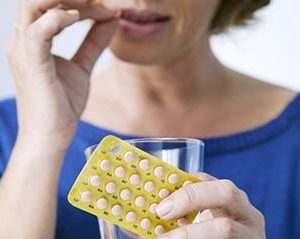- Could Your Grocery Store Meat Be Causing Recurring UTIs?
- Are You Making This Expensive Thermostat Error This Winter?
- Recognizing the Signs of Hypothyroidism
- 10 Strategies to Overcome Insomnia
- Could Artificial Sweeteners Be Aging the Brain Faster?
- Techniques for Soothing Your Nervous System
- Does the Water in Your House Smell Funny? Here’s Why
- Can a Daily Dose of Apple Cider Vinegar Actually Aid Weight Loss?
- 6 Health Beverages That Can Actually Spike Your Blood Sugar
- Treatment Options for Social Anxiety Disorder
Hormone Replacement Therapy Could Ease Depression Around Menopause

Hormone replacement therapy might help women avoid depression as they go through menopause, a new study finds.
Women treated with hormone therapy at a menopause clinic in Ontario, Canada, experienced a reduction in their symptoms of depression, researchers report Feb. 21 in the journal Menopause.
This improvement occurred whether or not antidepressants were also prescribed, results showed.
“This study showed a beneficial effect of hormone therapy on mood symptoms during menopause when used alone and a synergistic effect when used in combination with antidepressants,” said Dr. Stephanie Faubion, medical director for The Menopause Society.
“It also highlights the high prevalence of mood symptoms during this transition and the need to address women’s symptoms holistically rather than having a singular focus on hot flash management,” Faubion added in a society news release.
Depression has been shown to be particularly likely to occur around the time of menopause, researchers said.
In this study of 170 women, about 62% of participants scored as “depressed,” said researchers led by Dr. Alison Shea, from The Research Institute of St. Joseph’s Healthcare in Hamilton.
Hormone therapy has been shown to effectively manage hot flashes, but its ability to address mood-related symptoms is less established, researchers said in background notes.
Hormones influence the brain pathways that regulate mood during and after menopause, and are thought to play a role in depressive symptoms, the researchers said.
The toll of all the physical symptoms that accompany menopause also could dampen women’s moods, they added.
Women who went through natural menopause experienced significant improvement in their symptoms of depression, researchers found.
However, women who went through menopause due to cancer treatment or surgery did not have similar improvements, results showed.
More information
Johns Hopkins Medicine has more on menopausal hormone therapy.
SOURCE: The Menopause Society, news release, Feb. 21, 2024
Source: HealthDay
Copyright © 2026 HealthDay. All rights reserved.










